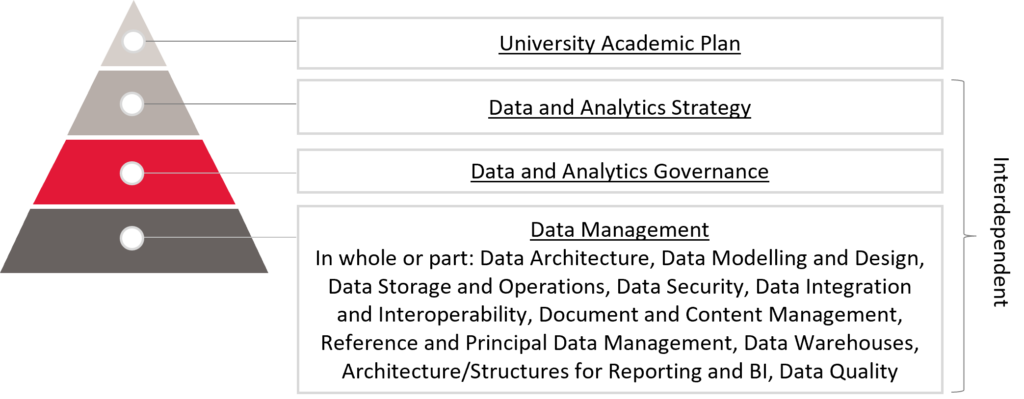York University's Data and Analytics Governance team is responsible for outlining institutional standards and policies regarding data, and managing a system of decision rights and accountabilities for information-related processes. Data Governance standardizes how data is defined, produced, used, stored, and destroyed.
Data Governance Vision
York University’s data assets serve as trusted sources of intelligence that impel the institution toward service excellence within its community.
Data Governance Mission
Implement enterprise-wide data protocols to reinforce data quality, literacy and utilization, and protect data security and privacy.
Data Governance Benefits
York’s Institutional Data and Analytics Governance is an ongoing, collaborative effort that will help strengthen data access, data integrity, and data security for York's students, faculty, and staff. As part of this process, common data definitions, principled data access rights, and data quality improvements will enable and enhance institutional effectiveness and data-informed decision making at York University.

Decision Rights and Accountabilities
The data governance framework includes processes, roles (Data Trustee, Data Steward, Data Custodian), responsibilities, committees, and working groups. These are key to managing data as an institutional asset.

Principled Access Rights
Through policies, frameworks, and processes, formalized and automated access rights will be developed.

Common Data Definitions
Institutional definitions will be developed. These will be housed in York University's Data Dictionary.

Improved Data Quality
Through policies and frameworks, and in collaboration with data management, data quality will be assessed, improved, and monitored.

Expanded Data Literacy
To improve our community's data capacity, data literacy courses and community of practice sessions will be developed.

Institutional Data Hub
In order to make data more accessible to our community, OIPA's Data Hub will be used as the institutional repository of data at York University.
Data Governance at a Glance
25
Data domains
105
Data sub-domains
2
Data governance committees
23+
Faculties and units involved in data governance committees
Actualizing the University Academic Plan
The 2020-2025 University Academic Plan (UAP) guides data governance and all related decisions and activities. Actualizing York’s University Academic Plan requires data governance standards that support how data is defined, produced, used, stored, and destroyed.

Data Governance and Data Management
Data governance establishes policies and procedures around data, while data management enacts those policies and procedures to compile and use data for decision-making.
| Data Governance | Data Management | |
|---|---|---|
| Summary | Outlines institutional standards and policies regarding data, and manages a system of decision rights and accountabilities for information-related processes. | Creates and implements architectures and processes that manage the full data lifecycle needs of York University. |
| Examples | - Data stewardship - Data quality: policies, requirements, rules, standards - Metadata management (Data Cookbook): data glossary, technical metadata - Data security, privacy, and compliance: policies, data classifications, guidelines on data usage, and retention, archival, and disposal of data ...and more | - Data architecture - Data quality: processes, assessments, cleansing - Principal and Reference data management - Data security - Data integration and extraction - Data warehouses - Data operations ...and more |
| Department(s) | - The Office of Institutional Planning and Analysis (OIPA) - Trustees, Stewards, and Custodians | - University Information Technology (UIT) - Various units and Faculties |
| Committees | - Data Trusteeship Committee - Data Stewardship Committee | - Data & Architecture Committee - Data Management Working Group |
Engaging with Our Community
Data governance is a team effort. In order to realize our highlighted benefits, we collaborate with departments, faculties, and community members across the University. Key partners include core members of data governance, data management, information security, privacy and legal, and the SSRP. Ongoing components key to actualizing the Data Governance Policy include the Data Dictionary, the Data and Analytics Community of Engagement, the Institutional Data Quality Program, and data sharing.
Methods of engagement with our community include:
- Presentations to committees, councils, and working groups
- Feedback sessions
- Website feedback forms
- Annual newsletters
- Stories "in-action"
- YFile articles
- YU Learn modules

Get Involved
To get involved with Data Governance at York University or to submit a request, click on the following links.
